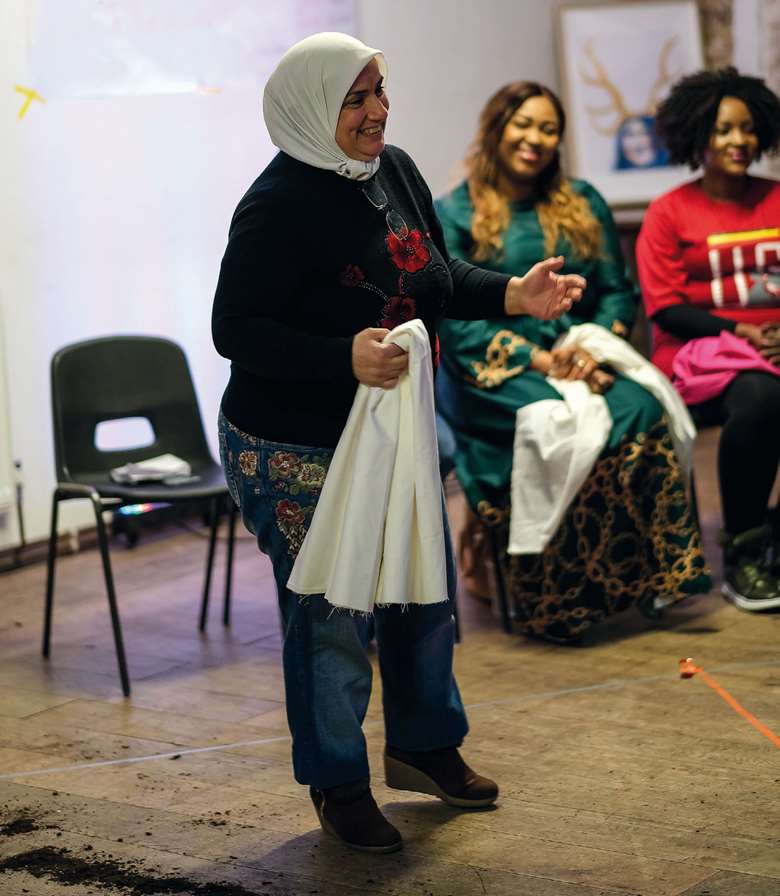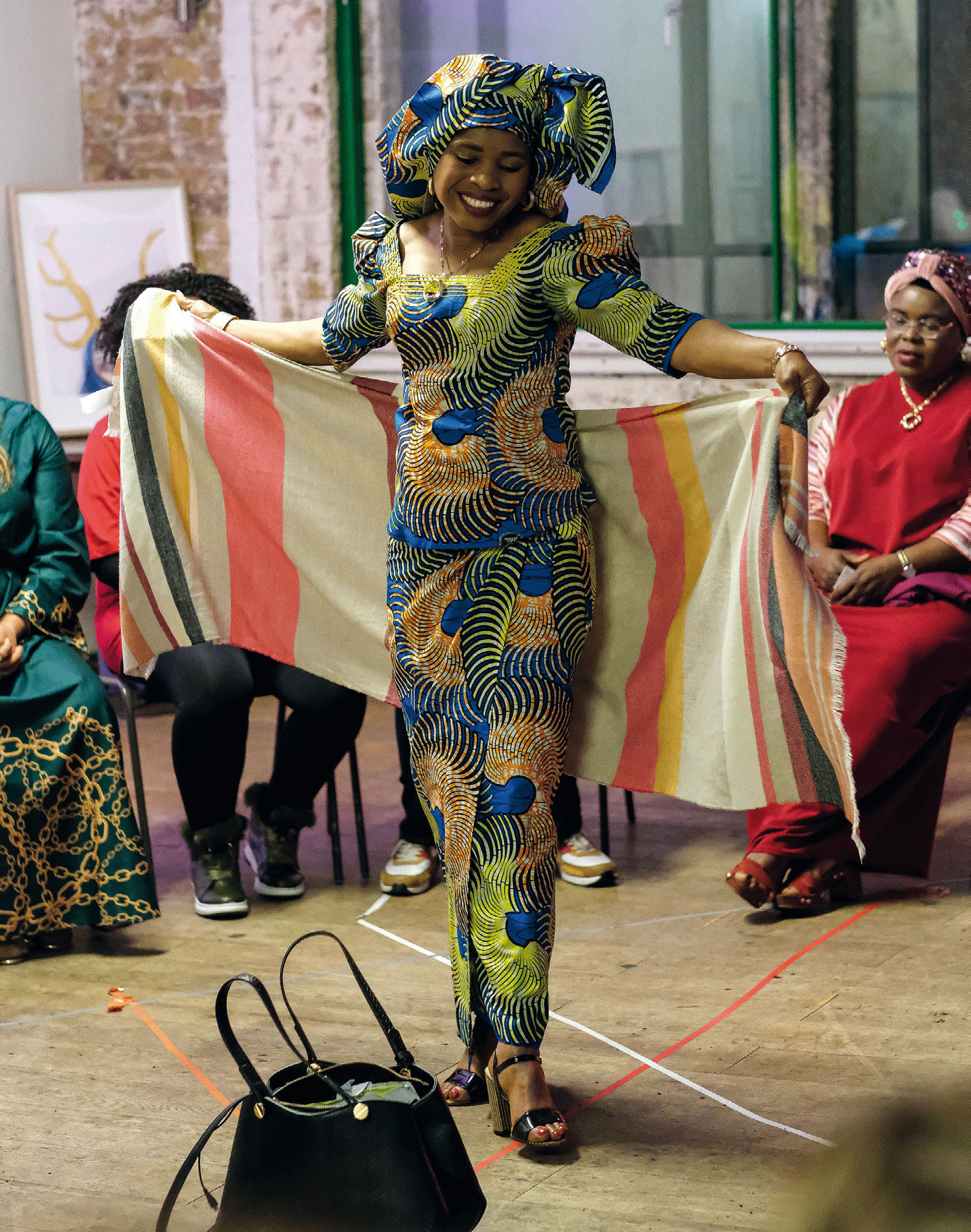Safe spaces
Sarah Lambie
Sunday, March 1, 2020
Sarah Lambie talks to the recipients of this year's Drama & Theatre Magazine Editor's Award about how they have made drama a sanctuary for women seeking asylum

ALESSANDRA DAVISON
On 4 March 2020 at the London Marriott Hotel, Grosvenor Square, a black-tie dinner and awards event celebrated the best the arts education world has to offer in terms of teachers, projects, resources and organisations which demonstrably improve music and drama education for students of all ages.
We gave awards in 16 categories, judged by a panel of expert judges from across the sector. However, one award fell to me to bestow on a winner of my choice: the Drama & Theatre Magazine Editor's Award gives me free reign to commend each year the work of one individual, organisation or product in drama education.
My winner for this year was the Routes Collective. Founded by two women: Daisy Jacobs and Leyla McLennan, in 2018, in their own words, ‘Routes was founded as a direct response to the additional barriers faced by women who are seeking safety in the UK. We exist to support refugee and asylum-seeking women by countering the hostile asylum system, bringing women together to support one another in spaces of joy, welcome and patience.’
Finding a voice
Back in December, I spoke to Daisy Jacobs on the phone, and she told me how the organisation came about. She and McLennan had both spent time in refugee camps in Europe: in Calais, and in Athens. In Athens in particular, Jacobs had seen how a theatre project taking place in the camp gave permission to do those very human things which can be stifled by the dehumanising experience of refugee status: permission to get angry, and to laugh, and cry. It was an emotional outlet for people who were otherwise trying continually to hold a lot of that instinct in.
‘A lot of people were aiming for England or France or another European country, so English was a really useful language to have,’ Jacobs told me, ‘so we pitched it to a certain extent as a language class – that was really how Routes started.’
‘After I came back from Athens, Leyla and I did a lot of research and a lot of work with women, and found out that specifically for women who were seeking asylum there were a huge number of barriers to accessing English language support.’
Travel expenses and childcare are not offered to support women's attendance, the waiting list for language courses can be 2–3 years long, and eligibility for free English support fluctuates according to the status of an individual's asylum application. Couple with that the fact that those who are able to access classes are in mixed-gender groups where often for cultural reasons, Jacobs explains, ‘we just found that women weren't speaking in those spaces, that the dominating voices were male, and it meant that a lot of women were trapped in a cycle where they had low levels of English, which meant that they had low confidence, which meant that they were really socially isolated, and the social isolation went back into having low levels of English.’
Jacobs and McLennan began working with the Bay Tree Centre in Brixton, ‘trialling classes that would speak to all elements of that cycle.’ They were experimenting with using theatre to improve people's language, ‘specifically the language that we use day to day – so we were rehearsing everyday scenes in everyday locations, thinking about the words that you might need. And we were re-enacting situations that had gone wrong for people when they didn't have the right words. We ran women-only classes and constructed all programmes to have mistake-making at their hearts, so all mistakes were celebrated, it was really fun.’
Both founders had experienced much around community-building through theatre. ‘The connections that you make with people are so much greater if you've spent two hours standing in a circle with someone and playing with them than if you're sat next to somebody at a desk,’ Jacobs remarks.
Widening opportunities
The effect of this, naturally, is that women from all over the world who have been incredibly isolated here, have begun to form friendships and support networks through the drama and language sessions they attend with Routes. ‘We pay travel expenses, we always provide childcare on site, we always provide food, and it's always women-only so it's speaking to all of the different barriers that people could be facing in accessing their English support.’
From these simple and effective beginnings, Routes has grown. Theatres including the Young Vic and the Arcola have given free space to the organisation to work in; the most recent programme culminated in a showing for family and friends which I attended and which was utterly uplifting – named by the group I am alive: the power of women and featuring scenes, speeches, artwork and lots of song, it was a true celebration of women, and community, and learning through doing.
Theatre trips have been organised, with companies offering free tickets, and the team at Routes are working with a number of theatres to build programmes which offer free theatre tickets to asylum seekers – a small contribution for the theatres to make but in fact an enormously humanising, culturally and emotionally valuable experience for this most marginalised group of people.

© ALESSANDRA DAVISON
The most recent programme culminated in a performance at the Arcola Theatre
‘One of our aims as an organisation is to widen access to opportunities and to places: so we try to do every programme in a different theatre building, as a way of giving people permission to come back to those buildings – both the Arcola and the Young Vic have cafés where you can just sit and you don't have to buy anything, no one asks you why you're there, they're both incredibly welcoming buildings.’
This inspired Routes’ Theatres of Welcome event in 2019: ‘At the beginning of October we took over the Dorfman Theatre for a morning and we had about 80 people from different theatres in London and across the country come together to find out how they can turn their theatres into welcoming spaces for refugees and asylum seekers.’ It's absolutely brilliant, in my opinion, that the sort of building which many native British people may assume to be off limits for someone of their background might be nonetheless one of the few places where a refugee could feel welcome, safe and at home.
‘My mum's a drama teacher,’ Jacobs told me, ‘I've been doing drama since I was 3 and teaching it since I was 15, and the confidence that it's given me as someone who I think is probably naturally quite introverted, is huge.’
‘The way that we work together as an organisation is through three values: joy, welcome and patience, and they came from an insight that we had that the asylum system is totally lacking in those three things, I really noticed it in Calais, and in Athens, and theatre, drama, brings those things in abundance. The joy of playing games is really special, the welcome of the fact that so much of drama happens in a circle, so much of it is about being seen and being heard, and then the patience of the way in which there is no wrong answer and whatever you bring is the right thing – I think theatre embodies that in such a big way, and the asylum system is just really hostile, constantly tells people that they're not believed, that they're wrong, that they shouldn't be here, that they're not welcome. This is such a powerful thing to create in the face of that: so necessary.’

